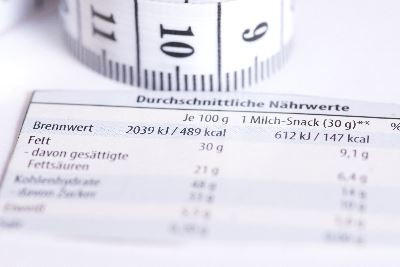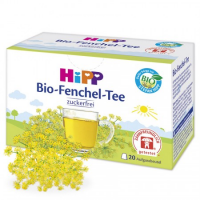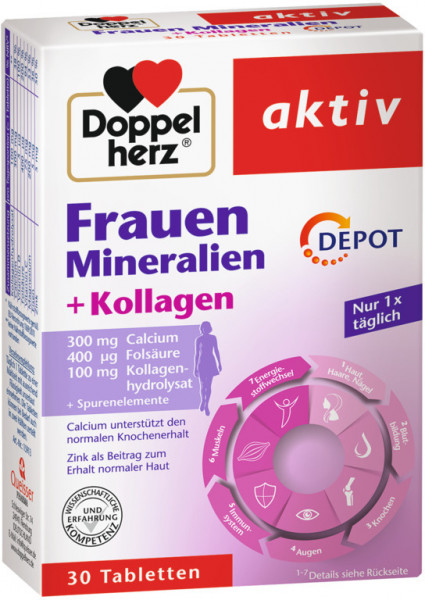| Quantity | Unit price | Reference price |
|---|---|---|
| To 2 | €5.25 * | €119.05 * / 1 kg |
| From 3 | €3.95 * | €89.57 * / 1 kg |
*prices incl. VAT plus shipping costs
Ready to ship today,
Delivery time appr. 1-4 days²
- Order number: 610011
- best before: 28.02.2025
- EAN: 4009932131598
- Manufacturer product ID: 15913
- PZN: 01534703
- advice: Kühl (<25°) und trocken lagern. Die angegebene empfohlene tägliche Verzehrmenge darf nicht überschritten werden. Nahrungsergänzungsmittel sind kein Ersatz für eine ausgewogene und abwechslungsreiche Ernährung und eine gesunde Lebensweise.

For bones, muscles, skin and the immune system
An optimal supply of vitamins and minerals is an important prerequisite for the well-being and performance of our body.
The women's minerals of double heart contain a combination of minerals, trace elements and selected vitamins, including folic acid. A sufficient supply of these nutrients is important for women at every stage of their lives in order to remain healthy and fit.
A sufficient supply should therefore be ensured, especially in the case of an unbalanced diet.
- in the years of development
- for women of childbearing age
- if you wish to have children
- during pregnancy and lactation
- menopausal
- at an advanced age
- as well as with one-sided nutrition
be respected.
However, the "National Consumption Study" (Nutrition Report 2008) showed that in Germany a needs-based supply of calcium, iodine, iron and folic acid as well as vitamin D is not always available.
Just one tablet of Doppelherz provides you daily with vital minerals and trace elements, meaningfully combined with folic acid, vitamin D and vitamin C.
calcium
- is needed for the preservation of normal bones
- contributes to normal muscle function
- contributes to normal blood clotting
magnesium
- contributes to normal energy metabolism
- contributes to the normal functioning of nerves and muscles
- has a function in cell division
iodine
- In pregnant women, the supply of iodine to the mother is important, as she supplies the unborn child with iodine.
- contributes to the normal production of thyroid hormones and to normal thyroid function
- contributes to the maintenance of normal skin and energy metabolism
folic acid
- plays a role in normal haematopoiesis and cell division
- contributes to normal maternal tissue growth during pregnancy
- contributes to the normal functioning of the immune system
- is a vitamin which is very sensitive to light and heat and therefore loses its effectiveness quickly through storage and preparation of the food.
iron
- contributes to the normal formation of red blood cells
- contributes to the normal transport of oxygen in the body
- plays a role in normal energy metabolism
- helps to maintain the normal function of the immune system
zinc
- plays a role in protecting cells from oxidative stress and in the normal functioning of the immune system
- contributes to normal bone preservation
vitamin C
- contributes to the protection of cells against oxidative stress
- supports the normal function of the immune system
- contributes to normal collagen formation for normal skin function
The "calcium installation aid" Vitamin D
Vitamin D can be produced by the body through regular exposure of the skin to sunlight. However, this in-house production is often not sufficient in our latitudes.
vitamin D
supports the normal function of calcium and contributes to the maintenance of normal bones.
| Filling quantity (weight): | 1g, 44g |
| Filling quantity (piece): | 30 |
| drug: | No |
| health: | immune system, Muscles & Bones, Products for her, Products for mothers, skin+hair+nails |
| country of origin: | EU / non-EU Agriculture |
| milk-free products: | Yes |
| gluten-free products: | Yes |
| Shipping weight: | 0,068 kg |
| Manufacturer: | Queisser Pharma |
| Made in: | EU (Germany) |
| product group: | Nutritional supplement / over-the-counter medicines |
| brand: | Doppelherz |
| further properties: | gluten free, non dairy |
| Target group: | Women |
Manufacturer contact: Queisser Pharma GmbH & Co. KG, Schleswiger Str. 74, 24941 Flensburg, Germany
 Queisser Pharma stands for healthy life and holistic well-being. As one of the leading German pharmaceutical companies, we can look back on more than 100 years of company history. At our headquarters in Flensburg, we develop, produce and market a wide range of selected products for the preservation and maintenance of health. Whether pharmaceuticals, medical devices, nutritional supplements or cosmetics - our range consists of high quality products.
Queisser Pharma stands for healthy life and holistic well-being. As one of the leading German pharmaceutical companies, we can look back on more than 100 years of company history. At our headquarters in Flensburg, we develop, produce and market a wide range of selected products for the preservation and maintenance of health. Whether pharmaceuticals, medical devices, nutritional supplements or cosmetics - our range consists of high quality products.
Each and every employee personally stands for the quality level of the products of Queisser Pharma. Our customers trust our products. This trust is based on the supply of high-quality, needs-oriented products.
Our task is to meet the demands of our customers for quality every day anew.
The focus of our activities in Germany and abroad are high-quality products for the preservation of health.
Queisser Pharma sells a wide range of over-the-counter medicines and dietary supplements under the Doppelherz brand . The products are sold in Germany in the pharmacy, in drugstores as well as the food retail trade.
In recent years, the product range has been steadily expanded to include innovative products, including the development of a wide range of vitamin and mineral preparations, which are characterized by ever new and intelligent compositions. Every day, customers opt for the company's quality products and make Doppelherz products one of the best-selling nutritional supplements in Germany.
The company history of Queisser Pharma
The company Queisser Pharma can look back on more than 100 years of company history. Comprehensive knowledge about health has a long tradition here.
The history of Queisser Pharma begins in 1897 in a small pharmaceutical factory in Hamburg. The graduate pharmacist Alfred Queisser had come from Lusatia in the district of Dresden to Hamburg to make his fortune as a manufacturer. He focused on the production of health and care products such as creams, liquid soap and toothpaste. Despite difficult circumstances, Alfred Queisser managed to continuously expand the company. He owed this to his extensive talents as a businessman, scientist and imaginative advertising expert, whom he united in one person.
The second root of today's Queisser Pharma was created by the Essen pharmacist Josef Peter Hennes. In 1919, he developed the original formula of today's Doppelherz® energy tonic from herbs and other natural ingredients. The tonic was produced and successfully marketed in the eponymous company founded by him.
Both houses eventually merged into "Queisser Pharma", which has been part of HGDF Familienholding Ltd. since the end of the 1970s. & Co. KG, a long-established Flensburg family business, whose parent company was founded in 1738 in Flensburg.
Queisser Pharma today
Since 1987, Queisser Pharma has its headquarters in Flensburg in the former production areas of a Rumherstellung. In addition to other brand products from Queisser, about 1 million liters of Doppelherz energy tonic are produced, bottled, packed and shipped in line with the market.
Queisser Pharma is guided by tradition and at the same time modern - with much grown experience and specialist knowledge, modern and innovative health products are regularly created.
Demand for health products has been increasing for many decades. Our headquarters in Flensburg has therefore been continuously adapted and expanded to meet the steadily growing popularity. Here many of our products are manufactured, packed and shipped in modern production lines. From Flensburg the products reach all over Germany and all over the world. To date, we have grown to about 300 employees. This makes Queisser Pharma one of the biggest employers in the city of Flensburg.

The future of Queisser Pharma
The market for health is constantly changing. Health is becoming more and more important for every individual as well as for the social institutions.
The self-responsibility for the health increases as well as the consciousness to be able to influence the health and their continuance actively and independently. Increasing life expectancy and the rising share of older people are setting new trends and presenting the healthcare industry with new challenges. For a company involved in health products, there are great opportunities for the future.
Health awareness and demographic change
A modern medium-sized company like Queisser Pharma must actively change in this fast-paced world. A change that is characterized by major market changes, which are caused not least by the demographic development of the population structure in all countries of the world.
Never before have so many people become so old, while at the same time remaining so young, healthy and actively involved in social life. The proportion of over-60s to 100 people between the ages of 20 and 60 will almost double by 2030. In 2050, 78 out of 100 people will be over 60 years old.
Health care and personal responsibility
Life expectancy increases from generation to generation. Even today, the sixty-year-olds can look forward to more than 20 more years of life. With age, there is an interesting trend towards active health care, prophylaxis and personal responsibility. Clearly recognizable is the endeavor to provide your body with everything necessary to achieve a strong and active old age. People know that they can not leave their health today alone to the doctors. They have to take their health into their own hands and act on their own initiative and responsibility.
 |  | ||||||||||||||||||||
Zusammensetzung | Zutaten | ||||||||||||||||||||
|
|
Calciumcarbonat, Magnesiumoxid, Füllstoffe Isomalt, mikrokristalline Cellulose und Polyvinylpyrrolidon, L-Ascorbinsäure, Überzugsmittel Hydroxypropylmethylcellulose und Hydroxypropylcellulose,Trennmittel Speisefettsäuren, Magnesiumsalze der Speisefettsäuren, Talkum und Siliciumdioxid, modifizierte Stärke, Eisenfumarat, Zinksulfat, Farbstoff Eisenoxide und Eisenhydroxide, Kokosöl, Pteroylmonoglutaminsäure, Kaliumiodat, Cholecalciferol | ||||||||||||||||||||
Für den besonderen Nährstoffbedarf von Frauen
Der Nährstoffbedarf von Frauen unterscheidet sich von Natur aus in vielen Lebensphasen von dem der Männer. Durch körperliche Veränderungen wie Pubertät, monatlichem Zyklus, möglichen Schwangerschaften und den Wechseljahren muss sich der Körper der Frau den unterschiedlichen Lebensphasen anpassen. Hierfür benötigten sie jeweils angepasste, spezielle Nährstoffe.
Auch wenn sich Frauen im Durchschnitt tatsächlich gesünder und ausgewogener ernähren als Männer, nehmen sie trotzdem einige Nährstoffe in zu geringer Menge zu sich.
Laut der aktuellen DEGS1-Studie des Robert-Koch-Instituts erreichen nur 15 % der Frauen und 7 % der Männer die Empfehlungen der Deutschen Gesellschaft für Ernährung.
So trifft zum Beispiel eine unzureichende Eisenversorgung das weibliche Geschlecht häufiger als Männer, da sie durch die Menstruation Eisen verlieren. Gleiches gilt für den Mineralstoff Calcium – durch Schwangerschaften und schlechtere Calciumaufnahme des Körpers nach den Wechseljahren ist die Versorgungslage bei Frauen manchmal unzureichend.
Spurenelement Eisen – für Frauen bitte eine Extraportion
Das Spurenelement Eisen sollten wir täglich in ausreichender Menge zu uns nehmen, da es vielfältige Aufgaben im Körper übernimmt. So trägt es zum Beispiel zur Bildung der roten Blutkörperchen und des Hämoglobins bei und unterstützt den Sauerstofftransport im Blut. Zudem spielt es eine wichtige Rolle für den Energiestoffwechsel und die Zellteilung.
Durch die Menstruation verlieren Frauen das lebenswichtige Eisen. Tatsächlich kann bei starken Monatsblutungen der Eisenverlust die Eisenaufnahme übersteigen, denn in 1 ml Blut sind durchschnittlich 0,5 mg Eisen enthalten. Dadurch haben Frauen mit 15 mg Eisen einen höheren Bedarf als Männer, die einen täglichen Bedarf von 10 mg haben.
Während einer Schwangerschaft steigt der Eisenbedarf, da das Ungeborene das Spurenelement auch für die Blutversorgung und den Aufbau der inneren Organe benötigt. Bei einer schwangeren Frau erhöht sich die Blutmenge, um die Durchblutung der wachsenden Gebärmutter sicher zu stellen.
Ihr Körper benötigt nun tagtäglich zwischen 20 - 30 mg Eisen.
Auch während der Stillzeit ist der Eisenbedarf noch erhöht, da die Stillende ihr Baby über die Muttermilch mit dem Spurenelement mitversorgen muss.
Der Schafi Tipp: Greifen Sie öfter mal zu einem Stück Fleisch, denn der Körper kann Eisen aus tierischen Lebensmitteln besser verwerten als aus pflanzlichen. Aber natürlich sind auch Hülsenfrüchte, Gemüse oder Vollkornprodukte gute Eisenlieferanten.
Mit Vitamin C-haltigen Lebensmittel, wie einem Glas Orangensaft, verbessern Sie die Eisenaufnahme von pflanzlichen Lebensmitteln.









 Double heart garlic capsules with mistletoe + hawthorn, 480 capsules
Double heart garlic capsules with mistletoe + hawthorn, 480 capsules  Doppelherz Hair Intensive, 30 capsules, 17.4g, food supplement
Doppelherz Hair Intensive, 30 capsules, 17.4g, food supplement 



 Doppelherz aktiv Magnesium 400 + Kalium DIRECT, 20 Micro-Pellets...
Doppelherz aktiv Magnesium 400 + Kalium DIRECT, 20 Micro-Pellets... 



 Doppelherz Augen Vital Sehkraft 90 capsules = 3-month pack, food...
Doppelherz Augen Vital Sehkraft 90 capsules = 3-month pack, food... 
 Frog Baby fabric softener, 750 ml (30 wash loads)
Frog Baby fabric softener, 750 ml (30 wash loads) 






 Double heart magnesium + calcium + D3, 40 tablets
Double heart magnesium + calcium + D3, 40 tablets 

 Reber specialities Mozartkugeln 45 pieces, 900g
Reber specialities Mozartkugeln 45 pieces, 900g  Haribo Primavera Strawberries tin 150 pieces, 1,05kg
Haribo Primavera Strawberries tin 150 pieces, 1,05kg  Double heart garlic capsules with mistletoe + hawthorn, 480 capsules
Double heart garlic capsules with mistletoe + hawthorn, 480 capsules  Doppelherz aktiv Magnesium 400 + B1 + B6 + B12 + Folic Acid,...
Doppelherz aktiv Magnesium 400 + B1 + B6 + B12 + Folic Acid,... 





 Doppelherz Glucosamine 1550 + Collagen + MSM, 100 capsules, food...
Doppelherz Glucosamine 1550 + Collagen + MSM, 100 capsules, food... 








 Doppelherz B12+D3 Duo Active Energy + Immune, 30 vials, food...
Doppelherz B12+D3 Duo Active Energy + Immune, 30 vials, food...  Doppelherz Hair Intensive 100 capsules, 58g, food supplement
Doppelherz Hair Intensive 100 capsules, 58g, food supplement 

 Doppelherz Vegetarian Vitamins + Minerals, 100 Tablets, Food...
Doppelherz Vegetarian Vitamins + Minerals, 100 Tablets, Food... 

 Doppelherz aktiv Magnesium 400 + B1 + B6 + B12 + Folsäure, 30...
Doppelherz aktiv Magnesium 400 + B1 + B6 + B12 + Folsäure, 30...  Doppelherz Magnesium + Calcium + D3, 120 Tabletten,...
Doppelherz Magnesium + Calcium + D3, 120 Tabletten,...  Doppelherz Knoblauch-Kapseln mit Mistel und Weißdorn, 270 Kapseln,...
Doppelherz Knoblauch-Kapseln mit Mistel und Weißdorn, 270 Kapseln,... 
 Doppelherz Active Skin+Hair+Nails, 100 tablets
Doppelherz Active Skin+Hair+Nails, 100 tablets 







 Doppelherz Augen Vital Sehkraft 90 capsules = 3-month pack, food...
Doppelherz Augen Vital Sehkraft 90 capsules = 3-month pack, food...  Doppelherz Augen Vital Sehkraft 30 capsules, 19,6g, food supplement
Doppelherz Augen Vital Sehkraft 30 capsules, 19,6g, food supplement 









